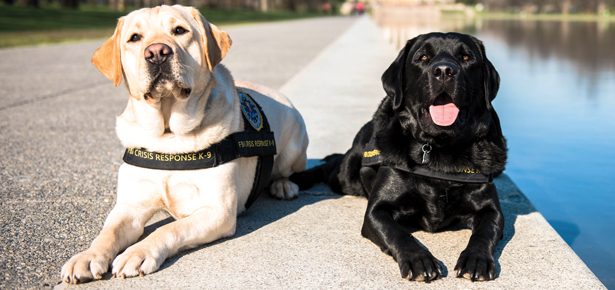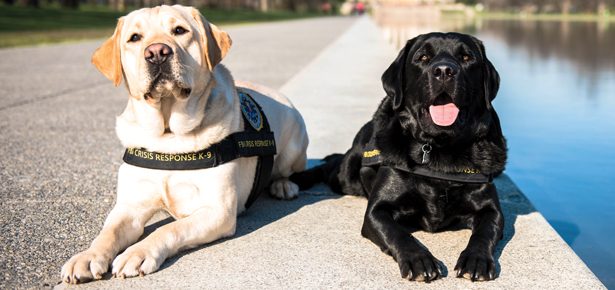

This FBI Member Has Four Legs
Remarkable canines are valued FBI team members, comforting kids in the wake of school shootings
Dogs have evolved by our side for over 30,000 years and have earned the title of “best friends.” They’ve learned to read our moods, and know how to calm us down, says Kerri Rodriguez, graduate researcher at Purdue University’s Centre for the Human-Animal Bond.
As research on the human-animal bond has exploded in recent decades, we’re uncovering the science behind this attachment. Within just 10 minutes, interactions with dogs lower our blood pressure, decrease our stress hormones (cortisol), and boost our cuddle chemical, oxytocin, creating a feeling of trust and wellbeing.
Our dogs’ ability to console us makes them helpful in tough times. “If (you’ve) gone through a traumatic event, affection without judgment is incredibly important,” says Kerri, who studied K9s for Warriors service dogs for veterans with PTSD. These dogs, all rescued from shelters, are trained to recognize when their owner is spinning out, and how to nudge them back to reality. Dogs also help in other fraught situations, like the aftermath of natural disasters or mass shootings. “Focusing attention on dogs can be a way of (concentrating) on the present, rather than reliving the traumatic event,” says Kerri.
The role of working dogs is expanding alongside the growing evidence of their effectiveness. Today canines are helping traumatized veterans, teaching empathy to young offenders, helping inmates learn responsibility and skills, comforting victims of catastrophes and mass shootings, and so much more.
Meet one canine assistance dog helping children following one of the most traumatic events imaginable—a school shooting.
When the teenage girl’s mother dragged her into the family assistance center in 2018 for victims of the Marjory Stoneman Douglas High mass shooting, it was clear that the girl just wanted to be left alone. She paced back and forth, silent and stony-faced, a distant look in her eyes. Her worried mom told FBI staff that her daughter had not left her room since witnessing the tragedy. 17 people—14 students and three staff members—had been killed at her Parkland, Florida high school on Valentine’s Day.
The teenager clearly did not want to be there. But then a smart, sensitive English Labrador Retriever called Giovanni—Gio for short—pulled her out of her paralysis. The student made a beeline for the dog, pulled up a chair beside him, and began talking to the animal. As she stroked and snuggled with him, her stiff posture loosened, and she engaged in a conversation with FBI Agent Melody Tiddle. By the end of the visit, the girl had agreed to talk to a therapist in the presence of Gio.
The teenager, “an incredibly brave young lady,” says Agent Tiddle, improved with every session over the next three days. She began reaching out to friends for support and processing the incident with the counsellor. “She was almost a different person,” says the FBI Agent.
The FBI agent credits her canine partner for the girl’s turn around. Gio’s presence lowered her defenses, she says. “He grounded her enough to be able to receive assistance.”
Gio is one of just two FBI Crisis Response Canines deployed to console victims and their families in the aftermath of mass shootings. They tag along with FBI staff during hospital visits, death notifications, family briefings, and other uncomfortable situations.
The canine counsellors come from the non-profit Assistance Dogs of the West, which breeds and trains dogs to assist the disabled, court witnesses, FBI employees, and others. Their breeding selects for resilience in the face of unpredictable environments, says the organization’s President and CEO, Linda Milanesi. Emotional intellect is another key quality. “Our dogs are full to over-brimming with love,” she says.
The organization’s training methods emphasize positive reinforcement and are designed to forge strong interspecies bonds. After graduating, the dogs are allowed to choose their future handlers. A happy dog will work harder for his human partner, says lead trainer Jodie Densmore. The “dog sticks with that person and really tries to troubleshoot,” she says.
The dogs have a tremendous effect on victims of violence. Not only do they alleviate stress in the moment, their presence can even reduce the odds of developing long-term post-traumatic stress disorder, says the trainer.
The canines take equally good care of the FBI staff at the Victims Services Division, where they reside between missions. “Our work is pretty heavy,” says FBI Agent Tiddle. On a tough day, she takes Gio outdoors, lobs him toys, and watches him go wild. Just witnessing his carefree exuberance turns around a bad mood. “He gives me a way to reboot,” says the agent. “I am super grateful that I’m his handler.”
Join the newsletter and never miss out on dog content again!
"*" indicates required fields
By clicking the arrow, you agree to our web Terms of Use and Privacy & Cookie Policy. Easy unsubscribe links are provided in every email.